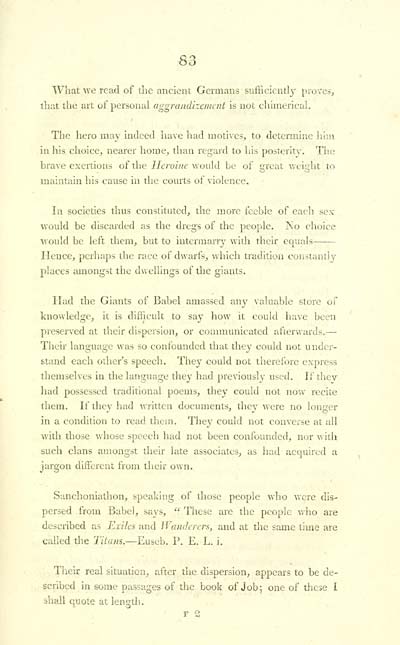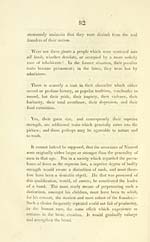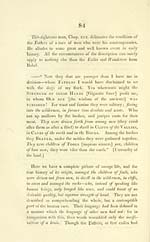Blair Collection > Celtic researches, on the origin, traditions & language, of the ancient Britons
(173)
Download files
Complete book:
Individual page:
Thumbnail gallery: Grid view | List view

Wliat we read of the ancient Germans sufficient]}' proves^
that the art of personal aggrandizement is not chimerical.
The hero may indeed have had motives, to determine liini
in his choice, nearer home, than regard to his posterity. The
brave exertions of the Heroine would be of great weight to
maintain his cause in the courts of violence.
In societies thus constituted, the more feeble of each sex
would be discarded as the dregs of the people. ISo choice
would be left them, but to intermarry with their equals
Hence, perhaps the race of dwarfs, which tradition constantly
places amongst the dwellings of the giants.
Had the Giants of Babel amassed any valuable store of
knowledge, it is difficult to say how it could have been
preserved at their dispersion, or communicated afterwards. —
Their language was so confounded that they could not under-
stand each other's speech. They could not therefore express
themselves in the language they had previously used. If they
had possessed traditional poems, they could not now recite
them. Iflhevhad written documents, they were no longer
in a condition to read them. They could not converse at all
Λvith those whose speech had not been confounded, nor with
such clans amongst their late associates, as had acquired a
jargon different from their own.
Sanchoniathon, speaking of those people who v.cre dis-
persed from Babel, says, " These are the people who are
described as Exiles and Wanderers, and at the same time are
called the î'í7í/íís.— Euseb. P. E. L. i.
Their real situation, after the dispersion, appears to be de-
scribed in some passages of the book of Job; one of these I
shall quote at length.
F 2
that the art of personal aggrandizement is not chimerical.
The hero may indeed have had motives, to determine liini
in his choice, nearer home, than regard to his posterity. The
brave exertions of the Heroine would be of great weight to
maintain his cause in the courts of violence.
In societies thus constituted, the more feeble of each sex
would be discarded as the dregs of the people. ISo choice
would be left them, but to intermarry with their equals
Hence, perhaps the race of dwarfs, which tradition constantly
places amongst the dwellings of the giants.
Had the Giants of Babel amassed any valuable store of
knowledge, it is difficult to say how it could have been
preserved at their dispersion, or communicated afterwards. —
Their language was so confounded that they could not under-
stand each other's speech. They could not therefore express
themselves in the language they had previously used. If they
had possessed traditional poems, they could not now recite
them. Iflhevhad written documents, they were no longer
in a condition to read them. They could not converse at all
Λvith those whose speech had not been confounded, nor with
such clans amongst their late associates, as had acquired a
jargon different from their own.
Sanchoniathon, speaking of those people who v.cre dis-
persed from Babel, says, " These are the people who are
described as Exiles and Wanderers, and at the same time are
called the î'í7í/íís.— Euseb. P. E. L. i.
Their real situation, after the dispersion, appears to be de-
scribed in some passages of the book of Job; one of these I
shall quote at length.
F 2
Set display mode to: Large image | Transcription
Images and transcriptions on this page, including medium image downloads, may be used under the Creative Commons Attribution 4.0 International Licence unless otherwise stated. ![]()
| Early Gaelic Book Collections > Blair Collection > Celtic researches, on the origin, traditions & language, of the ancient Britons > (173) |
|---|
| Permanent URL | https://digital.nls.uk/75765784 |
|---|
| Description | A selection of books from a collection of more than 500 titles, mostly on religious and literary topics. Also includes some material dealing with other Celtic languages and societies. Collection created towards the end of the 19th century by Lady Evelyn Stewart Murray. |
|---|
| Description | Selected items from five 'Special and Named Printed Collections'. Includes books in Gaelic and other Celtic languages, works about the Gaels, their languages, literature, culture and history. |
|---|

